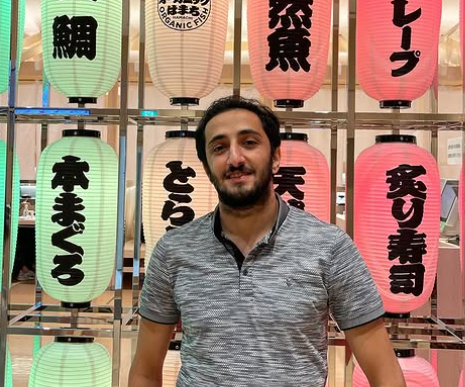
- ARAB NEWS
- 02 Jul 2025

When Iskandar Salama fled Syria for Lebanon amid the civil war, he never imagined he would one day be helping bridge the gap between his homeland and Japan.
The 32-year-old now works as chief technology officer at Tokyo-based systems development company BonZuttner, connecting Syrian IT talent with Japanese businesses.
Salama, a computer science graduate from Damascus University, joined the Japanese Initiative for the Future of Syrian Refugees (JISR) in 2018.
Administered by the Japan International Cooperation Agency, the program provides scholarships for young Syrian refugees to study in Japan.
After completing a master’s degree in engineering at Sōka University, Salama joined BonZuttner in 2020, where he oversees a project commissioning Syrian engineers to develop software for Japanese companies.
“I’m able to share what I’ve learned in Japan with my fellow Syrians,” Salama said, according to Nippon.com.
The initiative enables displaced Syrians to earn income while addressing Japan’s IT labor shortage.
Salama explained that it is challenging to convince Japanese clients of refugees’ skills, and he highlighted Syria’s untapped potential.
“We try to place the right people in the right roles,” he said.
BonZuttner was founded in 2019 by Sakashita Yūki, who was inspired by the plight of Syrian refugees after a shocking 2015 image of a drowned Syrian boy went viral. Through volunteer work with the NPO WELgee, Sakashita realized that many skilled refugees struggled to find work in Japan.
Teaming up with Syrian IT engineer Maher Al Ayoubi, and later Salama, he launched BonZuttner to harness refugee talent for Japan’s IT sector.
“Refugees can revitalize Japanese society,” Sakashita says, calling for businesses to actively support refugee career development. He sees refugees as valuable human resources who can help address Japan’s labor shortages while benefiting from professional growth opportunities.
In 2022, BonZuttner partnered with Baobab, a Japanese firm specializing in AI data annotation, to create remote IT work opportunities for refugee women. The program, which supports participants in Syria, Ukraine, and Africa, allows women to work flexibly from home.
BonZuttner oversees efforts for Syrian and Lebanese participants, as well as Syrian women in Japan, including spouses of JISR students.
Beyond his professional work, Salama contributes to “Japan Bridge,” a group of JISR graduates raising funds for earthquake victims in Turkey and Syria. The organization is constructing permanent housing for families displaced by the 2023 disaster.
In his interview with Nippon.com, Salama said he dreamt of further expanding opportunities for Syrians in Japan and envisions contributing to his homeland’s recovery from afar.
“When the time comes, I look forward to helping rebuild Syria from Japan,” he said.
Japan’s efforts to integrate refugees remain limited, but programs like JISR and companies like BonZuttner show how education and employment can create pathways for displaced individuals to contribute meaningfully to their host countries.